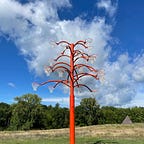How to save our non-profit ecosystem: Lessons from public health
By Suzette Brooks Masters
The coronavirus pandemic has turned our world upside down, seemingly overnight. The non-profit sector, like other sectors, is reeling. Many non-profits will not survive the next few months, just as too many people who will lose their battle with COVID-19. How can we ensure that the best of what they do will endure even if they do not, that the ecosystem they were a part of stays strong, effective and resilient even as it shrinks?
Responses to the pandemic that have elevated new norms allowing collective interests to supersede individual ones offer interesting examples of behavior modeling that can be applied to the non-profit sector. The prime example, physical distancing, is now accepted as THE main weapon in the collective fight against the spread of the virus even though it results in personal and professional sacrifice. This is a profound departure from the individualistic ethos we are all used to. Can a more ecosystem-wide mission-driven lens help the non-profit sector plan for, adapt to, and emerge more resilient from the pandemic? I believe it can.
At this unprecedented moment of deep economic and psychological distress, of uncertainty and disruption, the non-profit sector should engage in planning to ensure that as it shrinks, which it inevitably will, it does so in the optimal way. To ensure its health and survival, the non-profit sector’s response to the pandemic should mirror that being advocated by public health experts: triage and consolidation, mobilization, and socialization.
A plan of this type would require a major shift in attitudes and culture because non-profits (including their staff, boards, and donors) are focused on individual organizational viability and sustainability, not on the viability and sustainability of the broader ecosystem supporting their mission.
In a time of scarcity, organizations are likely to fight over scraps as they fight for their survival. Is there a better way? A solidarity mindset is preferred precisely to avoid the perversity of competition and the suboptimal outcomes that will result. We’ve seen how counterproductive it is when states, cities and hospitals compete for ventilators and personal protective equipment, rather than aggregating resources and deploying them systematically and equitably to areas in need when they are needed. Non-profits are similarly competing for resources now. The organizations most likely to survive this crisis will not necessarily be the ones doing the most vital work, but those that can procure the most resources, have deep-pocketed donors or well-connected boards. Maybe that’s what the “market” will lead to, but can we do better?
So what could a public health “solidarity” approach mean for the non-profit sector?
Triage and Consolidation in the Ecosystem
The pandemic will cause many casualties in the non-profit sector. What planning and convening efforts are needed now to identify those organizations most likely to survive, and preserve the best programs, staff and ideas of those that won’t? How can we assure that the survivors are stronger and more resilient, better able to withstand future disruptions, and better able to serve their communities and their constituents more broadly now that so many of the other non-profits have folded? How will this consolidation take place and with whose guidance and support?
Mobilization of Implementers and Volunteers
Can we stand up at scale a 50-state corps of volunteer or lo-bono lawyers, management professionals and reorganization specialists (or at least in the states with the most non-profits initially) to facilitate, plan and execute the inevitable consolidation that will take place across the sector in the coming months? Can this “Consolidation Corps” help non-profit leaders in organizations large and small engage in a new kind of collective thinking, planning and decision-making, prepare the legal work and secure the regulatory approvals to make this purposeful consolidation possible? Can they persuade governors, statehouses and attorneys general to streamline processes and reduce barriers to make it easier for non-profits to shut their doors or merge with others? Can philanthropy fund this new capacity fast enough, and step up as trusted convenors to encourage their grantees to engage in these wrenching but essential conversations?
Socialization of New Norms
Public health officials have transformed the behavior of people across the globe — exhorting us to wash hands, quarantine and distance. What are the equivalent new norms and practices the non-profit sector needs to adopt? Just as spring break partyers are now seen as deeply irresponsible for activities that were “normal” just a few weeks ago, how can we guide non-profits to adopt norms and behaviors that reinforce selfless behavior for the benefit of all? I urge major non-profit associations, philanthropists, philanthropy-serving organizations and umbrella groups, as well as sector leaders and influencers to endorse this more collective approach and help make it a reality. Non-profits must be given the permission to do good in a different way in this moment, to override their instinct to worry only about their own organizations, clients and staff for a broader collective good. Can we embrace and normalize the idea of sacrifice for the collective good, apply it to the non-profit sector, and fund it generously?
We were caught flat-footed in our response to the pandemic in the U.S. We didn’t plan early enough, weren’t decisive enough, and didn’t think through how bad it could get. We didn’t plan for the worst and let precious weeks escape us as the virus took hold. Let’s not make the same mistake with our non-profit ecosystem. We know many organizations will close, just as we know many will die from COVID-19. But their missions need not fail. We can choose to prioritize mission over the individual organization. But we must plan and invest now to make sure we are able to adopt a wider view and save vital programs before it’s too late.
There is no time to lose.
Suzette Brooks Masters is Senior Strategist at the Center for Inclusion and Belonging. She has co-founded a non-profit, served on numerous non-profit boards, and been a grant maker.
